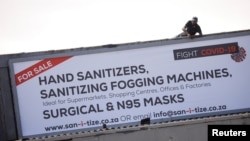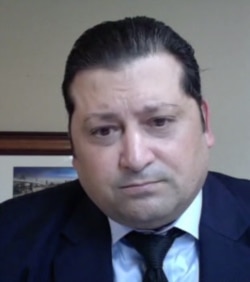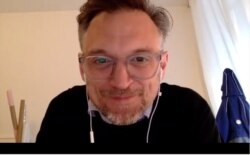With trillions of dollars in emergency assistance loosed in the global response to COVID-19, some observers warn of ripe conditions for another pandemic: corruption.
“The more funds that are distributed, the more likely it is that people are going to try to steal that money,” said Jeff Cortese, a former acting chief of the FBI’s public corruption unit now working in private-sector risk management. While corruption is ever present, he said, “this is, for the first time, happening on a global scale simultaneously.”
Governments, businesses, nongovernmental organizations and charities at every level, in every country, are preoccupied with their own immediate challenges, so Cortese and others in the anti-corruption arena foresee more potential for graft, price gouging, embezzling and other misdeeds – and more need to counter it.
In Uganda, four government officials were arrested in April and accused of colluding to commit fraud by inflating the price of food relief amid the crisis.
In China, scam artists have offered online sales of ventilators they might not even possess or charged hospitals up to five times the regular price of machines to help patients breathe, a Bloomberg investigation found.
In the United States, a Michigan medical supplier peddled boxes of 10 N95 respirator masks for nearly $100 – more than six times the pre-pandemic price of $15 – until the state attorney general sent a cease-and-desist letter.
Concerns abound in balancing the need for speeding access to medical supplies, aid, jobless claims and business bailouts versus providing entry to criminals.
In an emergency, “you do need to be able to react quickly … and sometimes that means that you do need to suspend normal procurement processes” such as open, competitive bids, said Max Heywood, head of policy and advocacy for Transparency International. But the anti-corruption agency, based in Berlin, urges quickly implementing controls to make processes more visible.
“It is essential to maintain a basic level of transparency around what contracts are being signed, what amounts are being spent,” he said. That way, “at the very least there's a paper trail or a digital trail that allows for some accountability once the main wave of this crisis has passed by.”
As Heywood pointed out, every dollar wasted “is a dollar that is not reaching the intended beneficiary.”
Shared responsibilities
As with combating infection, everyone has a role in fighting corruption, said Cortese, Heywood and his colleague Mokgabo Kupe, Transparency’s regional adviser for southern Africa.
They identify government, business, the public and media as key players.
“When they are all four healthy and fighting against corruption in a concerted effort – not necessarily shared, but at least an equal degree of effort – you will find your healthiest anti-corruption region,” Cortese said. “If the government refuses to address corruption or doesn't manage it in the way that [it] should, it is incumbent upon those three other groups … to encourage and hold the government accountable, whether it's through voting, voice, articles or refusal to do business in a particular area.”
A quest for government leadership
Political will is essential, Kupe says. Heads of government and legislators, as “creatures of the national budgetary process,” must demand adequate funding for anti-corruption institutions and efforts.
Corruption risks grow more daunting in poor nations. Sub-Saharan Africa – with the largest concentration of low-income countries – too often has the least favorable regional score in Transparency’s annual Corruption Perception Index. Most recently, it scored 32 out of 100 points, against a global average of 43.
Kupe explained the low score. The continent has fast-growing economies but insufficient business frameworks and trade barriers, prompting “really high levels of bribery and corruption.” Too few institutions tackle corruption; those that do often lack money and expertise. “And then, in parallel, you might not even have effective legal frameworks.”
On top of that, Kupe said, “the bad guys are, you know, getting smarter and smarter.”
To combat misdeeds, Kupe said, entities such as the World Bank and the International Monetary Fund (IMF) should use their clout to make anti-corruption “a priority for states. … Politicians act where there is pressure to act, and the pressure usually comes from donors or those that hold the purse strings.”
For instance, the World Bank and aid partners have applied pressure on Mozambique. The southern African country’s history of corruption, including the 2016 revelation of a $2 billion government hidden-debt scandal, led donors to cut off direct funding several years ago.
When Mozambique’s finance ministry recently sought more than $700 million to cope with the pandemic, the World Bank, the U.S. Agency for International Development and the United Kingdom opted to give in-kind support rather than money, the All-Africa website reported. It said donors were directly procuring medical goods such as intensive-care beds, N95 masks, pulse oximeters and body bags.
“Aid in the form of goods would be easier to monitor” than money, said Inocencia Mapisse, an economist and researcher with the Center for Public Integrity in Mozambique. She said that approach supports good governance in her country, where financial aid “has proven to end up generating appetites” for personal gain.
In late April, the IMF approved a disbursement of roughly $309 million to help with pandemic-related fiscal needs in the country, still reeling from two cyclones in 2019. The IMF is documenting the Mozambique government’s major economic responses, along with those of 192 other economies, on its COVID-19 policy tracker website.
But the IMF doesn’t go far enough in monitoring its COVID-19 aid, Transparency International, Human Rights Watch and Global Witness wrote to the fund’s executive board in an April 8 letter, The watchdog groups contend the IMF “should require transparency and anti-corruption measures” when disbursing funds for emergency relief programs to ensure help for the most vulnerable.
The IMF did not respond to several VOA requests for comment.
A call for enforcement
Cortese, the former FBI official, said governments also must commit to enforcing legislation: “You can have the greatest laws in the land, but if you don't have law enforcement willing to investigate, prosecutors willing to prosecute, judges willing to be objective, then those laws are meaningless.”
In the United States, the Justice Department has warned of COVID-19 scams and directed all 93 U.S. attorney’s offices “to prioritize the detection, investigation and prosecution of all criminal conduct related to the current pandemic.” With suspected price gouging of masks, hand sanitizers and other sought-after supplies, state attorneys general have issued cease-and-desist letters, leveled fines and filed lawsuits.
However, a month after approval of a $2.2 trillion emergency federal spending package on coronavirus recovery, several government oversight bodies have not yet been activated.
Business challenges
Transparency’s Heywood noted what he called an “encouraging” trend of stakeholder capitalism and of businesses committing to contributing to the social good.
“Now is the time to see to what extent those commitments were real,” he said, “and to see if businesses are being transparent … about their political engagements, about their lobbying activities.”
Cortese said businesses must not permit bribes, extortion or other unethical behavior, and “they must communicate that intolerance” to employees, customers and potential trade partners.
Public role beyond voting
As for citizens, their anti-corruption responsibility goes beyond voting.
“It's also about what happens in between elections,” Transparency’s Heywood said. “You know, do citizens have chances to participate and observe decision-making, to monitor where government funds are going?”
Especially during a crisis, he said, governments need to show openness so constituents have data and other information “to carry out that monitoring function.”
Kupe emphasized the importance of “an enabling environment.” Where civic space is restricted, “the citizens might have a lot to say, but they may not have a forum” in which to safely express their views.
In Zimbabwe, citizen activist Freeman Chari embraces that accountability mindset. He helped organize an online drive to raise $50,000 to supply health workers with personal protective gear, raising roughly $33,000 as of early Friday.
“We’re in the process of doing due diligence with GoFundMe itself,” Chari told VOA about the crowdfunding platform. “Then, when we buy anything, when we purchase and deliver, we make sure there’s a paper trail, there’s a record. … We have to account to … the people that have put [in] their $5, their $10.”
The media mission
Journalists have a responsibility to present information and serve as watchdogs in the public interest, all three agree.
Kupe said they also need an open environment in which to operate.
If journalists and news operations face expensive licensing, “you may only have one or two private media houses operating in that country,” depriving the public of diverse views, she said. Or, in the face of hostility, journalists might not “question as much as they should because they don't want to be shut down by the government.”
An argument for intolerance
Cortese said all four parties should employ what he called the “greatest weapon” against corruption: intolerance.
“Our greatest success will come from an intolerance of corruption within this global pandemic.”
Contributors to this report include Mike Hove of the Zimbabwe Service and Alfredo Junior of the Portuguese Service.









